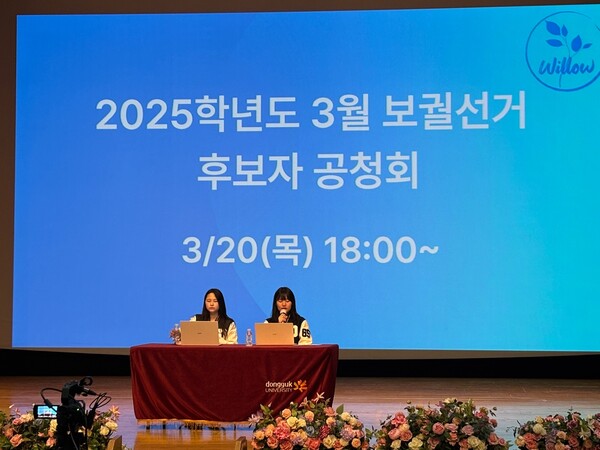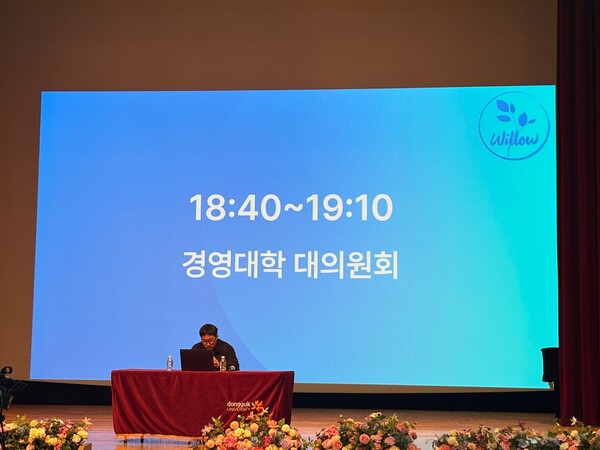2025 Dongguk University General Election Hearing – Day3
On March 20, 2025, the third session of the public hearing for the Dongguk University student council election was held. The hearing started at 6 p.m. in the Main Building and ended at approximately 7:10 p.m. Following the main session, by-election slates ‘Field’ and ‘B:right’ participated in candidate question-and-answer sessions. ‘Field’ is running for the College of Business Student Council, and ‘B:right’ for the College of Business Representative Council. The session lasted approximately 70 minutes and included both initial and additional rounds of questions directed at the candidates.
The Dongguk Post submitted its own set of questions to both ‘Field’ and ‘B:right’, avoiding duplication with other media outlets. This report presents the questions specifically addressed to the College of Business Student Council and the Representative Council.

1. The College of Business Student Council candidate, Field’
General Questions
Q: What is the core message of your campaign?
A: Our campaign slogan is “Unleashing Possibilities in the Field.” This represents our commitment to creating a “Field” where the limitless potential of College of Business students can truly flourish. Our core direction includes not only expanding welfare initiatives, but also actively listening to and representing students’ voices, improving the campus environment, and strengthening academic and career support. Through these efforts, we aim to cultivate a stronger and more vibrant Field for the College of Business.
Q: How would you evaluate this year’s student council?
A: In 2024, I served on the College of Business Emergency Response Committee and later took on the role of Vice Chairperson toward the end of the year. Throughout that time, I strongly felt the limitations of operating without an officially elected student council. Without formal representation, it was difficult to confidently speak on behalf of students, and many decisions had to be approached with great caution.
Moreover, within the Central Student Operations Committee, emergency committees do not have voting rights, which meant that the voices of the College of Business could not be fully conveyed.
In 2025, based on these experiences, we have come to deeply recognize the need to re-establish a functioning student council. Most current members of the Emergency Response Committee are now part of Field’s campaign team, working toward that very goal. We firmly believe our efforts will not be in vain, and we view 2025 as a year full of hope and renewed possibilities.
Questions from The Dongguk Post
Q: The operation of the academic festival is expected to require additional time and funding. Has coordination with professors already taken place regarding this matter?
A: Discussions have been held with the Office of Academic Affairs. Both the office and the professors have responded positively to the proposal. However, we would like to note that detailed meetings regarding specific aspects will be conducted after the election, if elected.
Q: Regarding environmental improvements, which specific areas are planned to be addressed? In addition, how do you plan to secure the necessary budget?
A: We believe it is essential to prioritize the voices of our fellow students when identifying areas for improvement. Therefore, rather than unilaterally deciding which areas to address, we plan to reflect the opinions and needs of students in selecting the focus areas.
Funding will depend on the scale and nature of each project. Since these improvements should be carried out within the scope of the student council budget, we will use student council funds for projects with reasonable costs. For larger initiatives, we will request support from the Student Affairs Office or the Office of Academic Affairs as needed.
Q: You mentioned plans to hold a business idea contest each semester. Could you explain in more detail how this will be conducted?
A: At the end of each semester, we plan to collect project ideas from students. After gathering submissions, the student council will evaluate the feasibility of each proposal. Those with high feasibility and strong expected engagement will be further developed and executed by the student council. We also intend to publicly share how student ideas are incorporated into our plans, to ensure active communication with the student body.
Q: One of the card news pledges refers to an academic calendar project, but the details were unclear. Could you elaborate on this pledge?
A: We sincerely apologize for this oversight. Due to an error during the preparation of the policy booklet, the explanation for the academic calendar was mistakenly replaced with information about a career seminar.
Referring to the content listed in the official candidate announcement, the academic calendar project involves creating and sharing a monthly calendar that includes academic schedules and events. This calendar will be posted on Instagram and Everytime to help students manage their school life more conveniently. In addition to official academic dates, student council events may also be included as appropriate.
Q: Based on your experience as a member of the Emergency Response Committee in 2024, what improvements do you think were needed, and what do you consider most important going forward?
A: Internally, there were concerns about the lack of clarity in the handover process and the division of responsibilities by position. This year, we aim to systematize the roles and responsibilities assigned to each position. Externally, as previously mentioned, the most significant issue was the limited representativeness of the emergency committee system itself. What we value most is sustainable progress. While launching new initiatives is important, we also believe that developing existing projects based on past experience is equally vital.

2. The College of Business Representative Council candidate, B:right’
General Questions
Q: What is the core message of your campaign?
A: The core message of the 57th College of Business Representative Council campaign, B:right, is to establish a council that communicates with students, earns their trust, and operates transparently. We are committed to doing our utmost to ensure that the College of Business truly belongs to its students.
Q: What are your three main pledges?
A: The three main pledges of B:right, the campaign team for the 57th College of Business Representative Council, are transparent disclosure, smooth communication, and the right to be informed. First, regarding transparent disclosure, we plan to share most council materials, including meeting minutes, to build a trustworthy Representative Council. We will also respond to major questions students may have regarding audits and legislation. Second, to promote smooth communication, we will establish an official Representative Council social media account and provide a channel for students to submit legislative proposals. Lastly, to uphold the students’ right to know, we will disclose the results of audits and elections.
Q: How would you evaluate this year’s student council?
A: In my seven semesters at Dongguk University, this is the first time that every department within the College of Business, including the college itself, has operated under an Emergency Response Committee system. While the limitations of such a system cannot be denied, I believe the committee performed positively overall.
Before the March by-election began, the College of Business Emergency Response Committee successfully organized major events such as the freshman orientation camp and campus tour. Department representatives also worked hard to ensure that first-year students could adapt to university life without difficulty.
That said, the continued absence of a Representative Council for several years has endangered students’ rights to information and participation in elections. Therefore, B:right is committed to restoring and protecting the rights of College of Business students.
Questions from The Dongguk Post
Q: You stated that most materials, including meeting minutes, will be disclosed to build a trustworthy Representative Council. How specifically do you plan to make this information public? Are there any additional measures to enhance accessibility and transparency?
A: We plan to disclose most materials, including meeting minutes, in order to build a trustworthy Representative Council. Specifically, we will open a social media account for the College of Business Representative Council and upload the materials to Linktree after each meeting. Additionally, to improve accessibility and transparency, we plan to distribute PDF versions of the documents through class group chats by working with department representatives.
Q: If you plan to disclose "most materials,” what criteria will you use to determine what is shared?
A: By “most materials,” we refer to both the meeting agenda distributed beforehand and the minutes recorded afterward. However, to prevent potential backlash or criticism toward individual speakers, we will not disclose the full transcript. Instead, we will share summaries of the decisions made during the meetings.
Q: You mentioned that you plan to provide answers to frequently asked questions to address student concerns regarding audits and legislation. Will there be an official channel or procedure for this?
A: To address concerns from College of Business students regarding audits and legislation, we plan to collect questions through an anonymous 1:1 KakaoTalk chatroom. We will respond to all questions submitted there and upload them to the Representative Council’s Linktree during the vacation period. Among these, key questions will be summarized into card news once a month and posted on the Council’s Instagram account.
Q: If there was no official social media account for the Representative Council in the past, how did the College of Business communicate with students?
A: The College of Business Representative Council has been inactive for several years. As far as we know, there has been no existing social media account for the Council. In the meantime, communication with students was conducted indirectly through the College of Business Student Council.
Ku Ji-won
Jeon Han-gyeol

